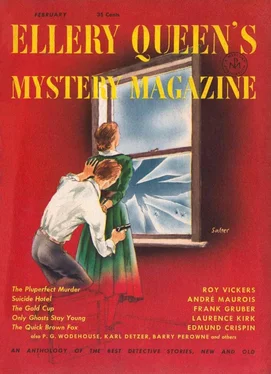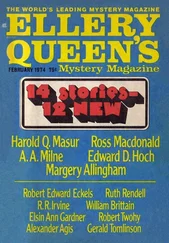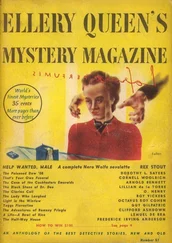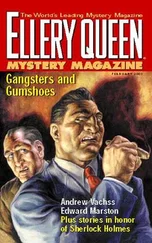E. Ashton - Ellery Queen’s Mystery Magazine. Vol. 19, No. 99, February 1952
Здесь есть возможность читать онлайн «E. Ashton - Ellery Queen’s Mystery Magazine. Vol. 19, No. 99, February 1952» весь текст электронной книги совершенно бесплатно (целиком полную версию без сокращений). В некоторых случаях можно слушать аудио, скачать через торрент в формате fb2 и присутствует краткое содержание. Город: New York, Год выпуска: 1952, Издательство: American Mercury, Жанр: Детектив, на английском языке. Описание произведения, (предисловие) а так же отзывы посетителей доступны на портале библиотеки ЛибКат.
- Название:Ellery Queen’s Mystery Magazine. Vol. 19, No. 99, February 1952
- Автор:
- Издательство:American Mercury
- Жанр:
- Год:1952
- Город:New York
- ISBN:нет данных
- Рейтинг книги:4 / 5. Голосов: 1
-
Избранное:Добавить в избранное
- Отзывы:
-
Ваша оценка:
- 80
- 1
- 2
- 3
- 4
- 5
Ellery Queen’s Mystery Magazine. Vol. 19, No. 99, February 1952: краткое содержание, описание и аннотация
Предлагаем к чтению аннотацию, описание, краткое содержание или предисловие (зависит от того, что написал сам автор книги «Ellery Queen’s Mystery Magazine. Vol. 19, No. 99, February 1952»). Если вы не нашли необходимую информацию о книге — напишите в комментариях, мы постараемся отыскать её.
Ellery Queen’s Mystery Magazine. Vol. 19, No. 99, February 1952 — читать онлайн бесплатно полную книгу (весь текст) целиком
Ниже представлен текст книги, разбитый по страницам. Система сохранения места последней прочитанной страницы, позволяет с удобством читать онлайн бесплатно книгу «Ellery Queen’s Mystery Magazine. Vol. 19, No. 99, February 1952», без необходимости каждый раз заново искать на чём Вы остановились. Поставьте закладку, и сможете в любой момент перейти на страницу, на которой закончили чтение.
Интервал:
Закладка:
The next evening, his pugilist guardian turned up, wearing his familiar checked cap and turtleneck sweater, his ears much eroded, and his Easter Island face embellished with criss-crosses of court-pi aster. But the running-away brought an end to Barry’s living with the fisticuff-man, and he was forced to say farewell to all the pictures of John L. Sullivan, Jess Willard, and Jack Johnson, and sent to his uncle who owned a livery stable in town. Now, near the livery stable was the old house where Conan Doyle had written his first Sherlock Holmes story, and after hearing many anecdotes about the big, hearty doctor, young Barry found himself tom between becoming a gentleman-crook and a gentleman-detective. He spent most of his time concealed in the stable, reading and rereading the adventures of Raffles and Sherlock, finding it harder and harder to make up his mind. Finally, he decided to become a writer, and through writing live both lives — for, vicariously, he could be both a cracksman and a criminologist.
Then later, when he was past twenty and already launched on his writing career, he went to live at an old inn in the New Forest. There he was taken to a fascinating house which he learned from the caretaker to be Sir Arthur Conan Doyle’s. That gave him one of the greatest thrills of his life. Many a morning, as he sat writing in the old pub, he used to peer out through the leaded panes under the thatched and dripping eaves, and see a burly, elderly, white-mustached man striding vigorously across the winter heath; and it seemed to Barry Perowne that the world was indeed full of bright wonder and queer chance and deep magic, and that the true wine of life was blue-black ink.
A few years later, in Majorca, he received a cable from a London editor, offering him a strange assignment. The editor had conceived the idea of reviving Raffles in modern form. Immediately, Barry Perowne’s mind flew back to that night in Gosport Gaol, and it seemed to him that many odd convergences — wheels within wheels — had linked his life permanently with that dashing, chivalrous cracksman of old. Arrangements were quickly made with the Executors of the Hornung Estate, and Mr. Perowne began to resurrect Raffles and his worshipful amanuensis and chronicler, Bunny. And as the years went by, Mr. Perowne wrote nearly a million words about Raffles and Bunny, and enjoyed every one of them.
Then, out of the blue sky, the auctorial heir of Hornung received a suggestion from your Editors: Why not, we asked, resume the Raffles stories, not in modern dress as Mr. Perowne had been writing them, but as nearly as possible in the true Hornung period, with that genuine aura of decadence and fin-de-siècle flavor which stills hangs over the original Hornung tales? The reviver of Raffles, despite his now vast intimacy with the character, had misgivings. Could he really do it? — the authentic Raffles, with his flair and flash, with his hedonism and public-school spirit, with his nonchalance and his nerve?
Well, here it is: a reverent and reverie-like pastiche of the one and only Raffles. But the author, Barry Perowne, can’t help wondering: Whatever is he going to say when, in the fullness of the hereafter, he finally meets Mr. Hornung?
In the cockney phrase, it was “Queen’s weather.” From a cloudless blue sky, the sun blazed down on the multi-windowed pile of Buckingham Palace. The royal standard shimmered red and gold in visible heat currents. Her Majesty was in residence, receiving distinguished guests to the midsummer military manuœvres due to begin on the morrow.
From the balcony of my club, near Carlton House Terrace, I looked down on the trees, vividly green, which lined the broad, straight Mall. Holding back a multitude of spectators, twin ranks of the Brigade of Guards were rigid in scarlet coats and towering bearskins, their bayonets torrid points of dazzle.
Fanfares, cannonading, and roars of welcome greeted the appearance of Europe’s kings and princes in a martial setting of square-jawed chiefs-of-staff and debonair aides-de-camp, with sovereigns’ escorts clattering in advance and in the rear.
Polished hooves drummed an intricate tattoo on woodblocks and melting asphalt as I looked down on the successive groups passing in a splendour of brass-glinting helmets and gold-gleaming spurs, of jewel-flashing orders and gemmed sword-hilts.
“Kings’ ransoms,” I told myself enviously, over and over — and I fingered the five miserable coppers in the pockets of my Savile Row trousers and wondered where on earth Raffles was.
Intuition told me that he must be somewhere among the crowd, taking note of the plunder, marking down his quarry. Impossible to believe that he would not seek to improve this shining hour! But in what guise might he be? He had so many. He revelled in what he called “a costume piece.” He was capable of as many impersonations as a music-hall artist.
I searched the crowd below in the Mall for some glimpse of him. The crowd was family England in its Sunday best. Overheated small boys in naval suits and straw sailor hats sucked sticks of “rock”; ladies in bustled dimity and sprigged muslin twirled their sunshades with a refined languour; flushed gentlemen lifted silk hats to mop brows glistening with perspiration and pomade. With Europe currently in a period of tension, one and all were eager to catch a glimpse of the monarch who disquieted a continent.
When, at last, he approached, it was to a scatter of cheers grown meagre and dubious. That he was aware of this diminished delight, and scorned it, I had no doubt as I watched him pass in the midst of his sovereign’s escort. His face was a grey, harsh mask of hauteur; his jet moustache was twisted up to points under his eyes; his spiked helmet flashed in the sun; his withered arm was thrust into the breast of his tunic. A falling hush accompanied his progress up the Mall toward the Palace.
His passing was the climax of the morning, the signal for a flow of movement in the Mall. Eager husbandmen with small barrows hastened out to glean where foreign horses had sown an alien corn to the enrichment of sylvan England. From the crowded balcony of my club, where on this special day ladies were tolerated, a drift started through the French windows to the dining-room for luncheon.
Fingering my wretched coppers, I stayed where I was. To seat myself in the dining-room would be only to invite a whispered excommunication from the old headwaiter. My credit was blown. And it was in vain that I sought to catch — as it were, casually — the eyes of opulent acquaintances.
No genial voice cried, “Are you lunching, Manders? Come and pick a chop with me.”
Most members, today, had resting caressingly on their sleeves the slender, gloved fingers of feminine guests. Those who had not were confirmed curmudgeons, or paupers like myself, or gruel-fed dodderers briefly resurrected from bath-chairs to quaver plaudits at a royal occasion.
I swung my stick moodily between my fingers, gazing down on the flow of saunterers and brilliance of banners along the Mall. Savoury aromas and convivial cork-poppings tantalized me from the dining-room. I was vulgarly ravenous. Prolonged deprivation had given me a figure on which my frockcoat never had sat better, but had brought no corresponding sense of well-being. A crust of bread and a cup of weak coffee full of grounds had been my breakfast. I had been seeking Raffles all morning without success.
I wanted to apologize for the lofty platitudes I had flung at him a few months before, when I had severed our felonious relationship. One of his burglarious exploits had brought us precious close to disaster; and I had mistaken my aftermath of tremors for the stirring of a belated virtue. My pockets full of my share of the loot, I had had the hypocrisy to reproach Raffles for his way of life. And when he only chuckled, I had flung out the Albany, where he had his rooms, vowing that I would earn an honest living by my pen.
Читать дальшеИнтервал:
Закладка:
Похожие книги на «Ellery Queen’s Mystery Magazine. Vol. 19, No. 99, February 1952»
Представляем Вашему вниманию похожие книги на «Ellery Queen’s Mystery Magazine. Vol. 19, No. 99, February 1952» списком для выбора. Мы отобрали схожую по названию и смыслу литературу в надежде предоставить читателям больше вариантов отыскать новые, интересные, ещё непрочитанные произведения.
Обсуждение, отзывы о книге «Ellery Queen’s Mystery Magazine. Vol. 19, No. 99, February 1952» и просто собственные мнения читателей. Оставьте ваши комментарии, напишите, что Вы думаете о произведении, его смысле или главных героях. Укажите что конкретно понравилось, а что нет, и почему Вы так считаете.












